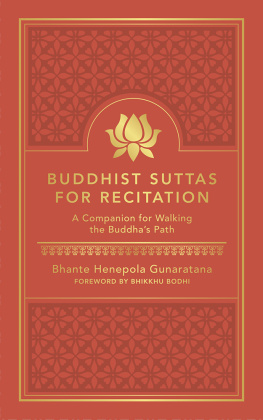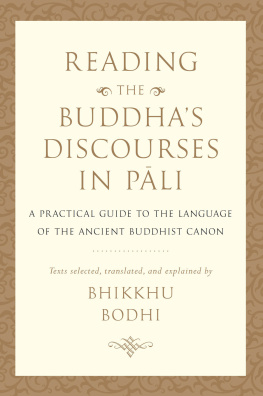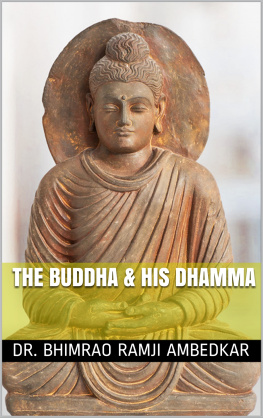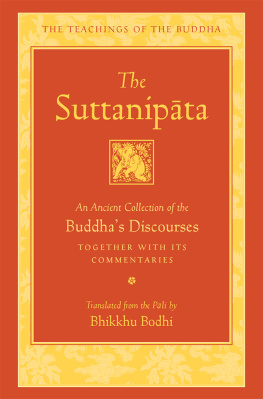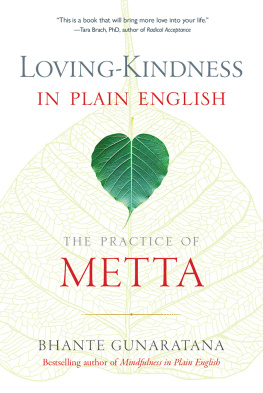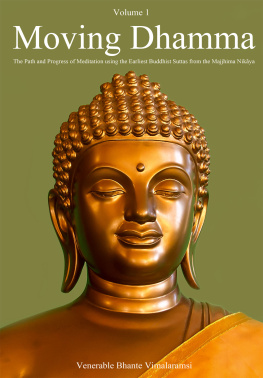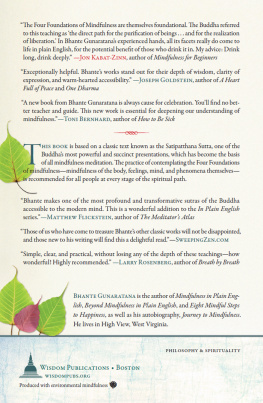
Wisdom Publications
199 Elm Street
Somerville, MA 02144 USA
wisdompubs.org
Wisdom edition 2019. Original edition published in 1999.
All rights reserved.
No part of this book may be reproduced in any form or by any means, electronic or mechanical, including photography, recording, or by any information storage and retrieval system or technologies now known or later developed, without permission in writing from the publisher.
Library of Congress Cataloging-in-Publication Data
Names: Gunaratana, Henepola, 1927compiler. | Bodhi, Bhikkhu, author of foreword. | Bhavana Society.
Title: Buddhist suttas for recitation: a companion for walking the Buddhas path / Bhante Henepola Gunaratana; foreword by Bhikkhu Bodhi.
Other titles: Bhavana vandana. | Bhavana vandana. English.
Description: Somerville, MA: Wisdom Publications, [2019] | Includes bibliographical references and index. | Text in Pali and English. |
Identifiers: LCCN 2018039800 (print) | LCCN 2019006259 (ebook) | ISBN 9781614295129 (e-book) | ISBN 9781614294894 (hard cover: alk. paper)
Subjects: LCSH: Buddhism Prayers and devotions English. | Buddhism Prayers and devotions Pali. | Pali language Study and teaching. | Devotion (Buddhism) | Dharma (Buddhism)
Classification: LCC BQ5551 (ebook) | LCC BQ5551 .B83 2019 (print) | DDC 294.3/4432 dc23
LC record available at https://lccn.loc.gov/2018039800
ISBN 978-1-61429-489-4 ebook ISBN 978-1-61429-512-9
23 22 21 20 19 5 4 3 2 1
Cover design by Marc Whitaker.
Interior design by Gopa & Ted2, Inc.
FOREWORD
WHILE MEDITATION IS SAID TO BE the heart of Buddhist practice, it must also be remembered that in the living experience of Buddhism meditation does not exist in a sphere of its own. Just as a heart functions as part of a living human body, so meditation functions as an integral part of a more extensive system of spiritual cultivation that ideally should permeate every aspect of human life. This system of spiritual cultivation aims at a deep transformation of the personality. It seeks to lift us from our familiar condition of ignorance, bondage, and suffering to a domain of unconditioned freedom, a state in which wisdom, purity, and unshakable peace prevail.
Analytically, we can discern in this process of spiritual cultivation at least four aspects, each of which might be compared to a different human capacity. The cultivation of wisdom nurtures understanding; the practice of meditation transforms the attentive, observational, and affective capacities of the mind; the cultivation of faith and devotion refines our aspirations and ideals; and engagement in ethical action gives dynamic expression to the sterling qualities of loving-kindness and compassion. When these four aspects of the path are cultivated in balance, each serves to ennoble a particular dimension of human life and makes its distinctive contribution to the attainment of the ultimate goal.
However, as Buddhism has taken root in the West, the philosophical and meditative aspects of the practice have been elevated above the other two sides, probably because of their novelty. But to take this one-sided approach is to overlook fundamentals. Just as the body stands on its legs and uses its arms and hands to accomplish its purposes, so the practice of the Dhamma stands on the legs of faith and uses the hands of moral discipline to act in the world with kindness and compassion.
As the legs of the Dhamma, faith supports and upholds all other modes of Buddhist practice, drawing them all into a single, highly flexible but unified path directed toward liberation from suffering. The prominence of faith in traditional Buddhist cultures is evident in the many ceremonies and rituals that punctuate the annual cycle of Buddhist life, from the celebration of Vesak, commemorating the birth, enlightenment, and passing of the Buddha, through Dhammacakka day, commemorating the first sermon, the Kathina ceremony, celebrating the end of the rains, and numerous other ceremonies and festivals, mainly local, that fall between these major events. Simple villagers find in these ceremonies a confirmation of their devotion, which fills them with joyful courage even in times of hardship.
In the monasteries of the Theravda Buddhist tradition, faith and devotion are expressed in the practice of communal recitation, which is typically held twice each day: early in the morning and in the evening. In Sri Lanka, these periods of recitation are called vandan, a Pli word that means homage or reverence. During the vandan service, the monks and the nuns in their own monasteries come together in the shrine room to pay homage to the Three Jewels, the Buddha, the Dhamma, and the Sangha, and to recollect the significance of their lives of renunciation. The service begins with a triple prostration to the Three Jewels, followed by pj offerings of lights, incense, and flowers. Then come the recitations. The recitations contain certain fixed components, invariable parts of the service, and other components that may vary from monastery to monastery, and, in a single monastery, from day to day. The fixed components, at a minimum, are the canonical formulas extolling the Three Jewels; the formulas for making offerings of lights, incense, and flowers; and reflections on the use of the four requisites. The service usually concludes with stanzas for sharing the merits generated by the devotion verses that invite the deities and other invisible beings to rejoice in the merits and in return to extend their protection to the world. The variable components will generally be drawn from a core group of suttas discourses of the Buddha and certain other texts such as standard verses on loving-kindness, the impurity of the body, and the inevitability of death.
The practice of vandan is not exclusive to monasteries. In the countries of Theravda Buddhism many devout lay Buddhists also include devotional recitation in their daily schedule. The texts they choose are largely left to their own discretion, but the most common items are the formulas for the Three Refuges, the Five Precepts, and the verses of offerings. The more devout will add the verses of homage to the Three Jewels, the three parittas or blessing suttas (the Mah-magala, Ratana, and Karayametta Suttas), and the verses on the sharing of merits.
The present book, Buddhist Daily Devotions, is the definitive collection of recitations used at the Bhvan Society in West Virginia. The book grew out of a much smaller compilation that Bhante Gunaratana and I prepared back in the early 1980s, when we were living together at the Washington Buddhist Vihara. Over the years that original compilation has grown incrementally. Through his experience guiding the monastic community at the Bhvan Society, Bhante G (as he is affectionately known) has added many more texts until the original small handbook has turned into a compendium offering a vast range of material for regular use. The introduction provides background information on devotional practice. It teaches how a layperson can start a daily routine of recitation, explains the relationship between meditation and devotional practice, offers instructions on setting up an altar or shrine room, and gives advice on how to utilize these texts to enhance ones development in the Dhamma.
The practice of regular recitation not only nurtures faith and devotion but also contributes to the growth of wisdom. As can be seen from a glance through the table of contents, Buddhist Daily Devotions includes many discourses of the Buddha from the Pali Canon that convey the essence of his teachings. If you recite these texts in a rotational pattern, perhaps one each day, the repetition will constantly remind you of such themes as the four noble truths, the three characteristics, the four establishments of mindfulness, and the ten great perceptions. In this way, the practice of recitation will gradually transform your frame of understanding, bringing it into increasing alignment with the Dhamma.

